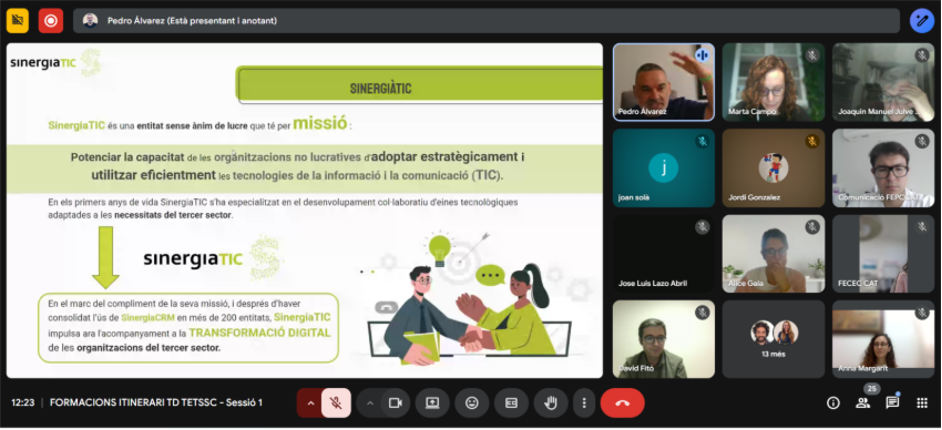Author: Taula d’entitats del Tercer Sector Social de Catalunya and Cluster Digital de Catalunya
Reading time: 3 minutes
“If everyone is focusing on data and digitization it’s because it’s necessary: it’s not about knowing what exists, but about knowing what we need and using technologies efficiently and strategically. No one will be able to escape digital transformation.”
With this forcefulness began the first local event in Barcelona, organised by Taula d’entitats del Tercer Sector Social de Catalunya and with Cluster Digital de Catalunya.
Around twenty social organisations participated in this first online open session where, in a practical and participative way, SinergiaTIC Association reviewed behaviors, perspectives, and attitudes related to digitization.
During the event, the objectives of a digital transformation process were explained: optimizing the use of ICT, reducing the digital divide, and improving data management without forgetting the mission of the organizations and seeking to maximize efficiency, impact, and optimization of services.
Change Management
One of the points most highlighted during the session was the need for widespread change within the organization regarding the use of tools and the systematization of new working dynamics. This change, furthermore, implies a deep understanding of the organization’s internal processes to then discard or reinforce certain procedures. It was also recommended to have financial resources to start and sustain the transformation process and to measure its results.
To do this, it was advised to create a group or a professional role that coordinates the whole process: “If this role does not exist, the organization will just buy tools, but it will be very difficult to initiate and carry out this transformation process.” On the other hand, the vocation for collaboration, social networking, and support was also emphasized because “we have the right to copy and the duty to share” Pedro Álvarez from SinergiaTIC stated.
Digital transformation in the social third sector
The second block of the session focused on the characteristic elements that condition the social sector in relation to digital transformation.
The participating federations agreed that these were: financing and the possibility of sustaining digital transformation processes; the localization of investment by organizations according to their mission: “we are sectors focused on caring for people and this creates difficulties in investing in transformation areas”; clear leadership that commits to digitisation; the heterogeneity of the sector, both in terms of service provision and in terms of professional profiles; the very nature of the sector, which makes automating data collection more complicated.
The five key elements of digital transformation are therefore:
- Strategy
- Data
- People
- ICT (as tools and technologies)
- Support to carry out this change
Operationalising the process and learnings
The need was highlighted for a Digital Transformation Plan and a roadmap with a timeframe, based on a diagnosis and with a clear prioritization of actions and a scheduling of them.
The main conclusions of the session were:
- If a digital transformation is to be undertaken, providers must be trustworthy and share values with the sector.
- Collaborative projects must be pursued: “join efforts to multiply results.”
- Social third sector organisations must be able to make their own decisions about digital transformation taking into account technological sovereignty: having control, knowledge, and decision-making capacity over those tools and key technology elements.
- The balance among the data being managed, the ICT solutions adopted, and the people using them is the cornerstone of digital transformation.
Learn more about our local workshops here.

